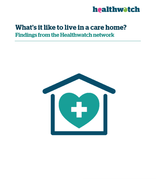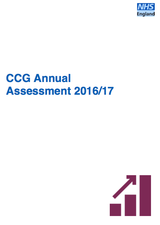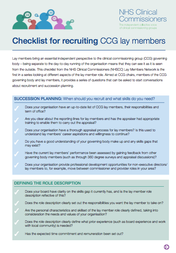NEWS - JULY and AUGUST 2017
|
WHAT IS LIKE TO LIVE IN A CARE HOME?
Findings from the Healthwatch network 28 pages About Us . Foreword . Overview . Understanding the Issues. . What our Visitors Saw . What Happens Next? . Thank You . Where Our Evidence Came From |
COPYING LETTERS TO PATIENTS
HAPIA investigated the use of the 2003 Department of Health Guidelines on copying letters to patients, the: 'Copying letters to patients - Good Practice Guidelines'. We investigated the use of these guidelines following several reports of patients not receiving copies of letters sent to their GPs. The Guidelines say:
“As a general rule and where patients agree, letters written by one health professional to another about a patient should be copied to the patient or – where appropriate, parent or legal guardian. The general principle is that all letters that help to improve a patient’s understanding of their health and the care they are receiving should be copied to them as of right. Where the patient is not legally responsible for their own care (for instance a young child, or a child in care), letters should be copied to the person with legal responsibility, for instance a parent or guardian”.
GUIDELINES: http://tinyurl.com/y7kdubew
On November 2016, we sent FOIs to a number of Trusts asking for details of the implementation of the Guidelines, and whether the Trusts include diagnostic radiology reports e.g. MRI and CT scans within the scope of copying letters to patients. We also asked whether the Trusts have a system to monitor compliance with the guidelines? A typical response came from Ashford & St Peter’s Hospitals NHS Foundation Trust:
“The Trust uses an outsourced transcription service to produce the majority of its clinical correspondence where a patient has attended an outpatient clinic. An electronic copy of each letter is sent to the patient’s GP and a hard copy is sent to the patient through the postal service. The sending of letters is usually an automated process so there is no guarantee a letter would not be sent unless the clinician gave explicit instructions to the clinical office administrator. Therefore it is possible that letters are sent to patients who do not wish to receive them for whatever reason and therefore 'Copying letters to patients - Good Practice Guidelines' is not being fully implemented at the Trust. In addition, there is no system in place at the Trust to monitor compliance since these are guidelines and therefore not necessarily Trust policy.
The Trust’s radiology department would not want to send reports directly to patients either as often they have a diagnosis in them that needs to be discussed before being given to the patient. That diagnosis would then be included in any subsequent letter. With regard to imaging in particular, the guidelines indicate that imaging reports are not expected to be sent directly to patients (see extract below):
‘Raw data’: 2.3 ‘Raw’ data, such as single test results, should not normally be sent directly to patients. Such data could include, for instance, an x-ray and its accompanying report, or the results of blood tests taken as part of a wider investigation of symptoms. In due course, the outcome of such tests should be included in a letter that is copied to the patient. Where no such letter is needed (for instance where a general practitioner has commissioned a range of tests), some other means of communicating the results to patients will be necessary”.
We decided to investigate this matter further and requested a meeting with Ashford and St Peters, who kindly agreed to meet with us. We met: Suzanne Rankin, Chief Executive, Dr David Fluck, Medical Director and Dr Jane Hibbert, Consultant Radiologist. The outcome of the meeting was as follows:
1) Suzanne Rankin confirmed that letters are routinely sent out to patients from OPD at the same time as sending to GPs.
2) We expressed concern that some patients are not receiving the letters and that reports from imaging are not routinely sent to patients. We also expressed concern that the terminology used in letters to GPs can be difficult for patients to understand. We suggested including a reference to NHS Choices in letters to GPs and patients.
3) We discussed GMCs Good Medical Practice, which describes the duties of doctors towards patients which include communicating information effectively.
4) We were told that if a patient does not wish to receive the letter sent to the GP about their medical condition, the system is not sensitive enough to record this decision and delete the letter from the distribution list.
5) Not sending letters to patients may also be important where there is evidence of domestic abuse. For example, an abusive partner may use information in a hospital letter to enhance coercive control or other abuse.
6) We discussed the process of sending letters to people who lack capacity and may have appointed a family member to act on their behalf (power of attorney). That person should be flagged on the system. Flagging should also include PAS (Patient Administration System) and Ibis care plans.
7) We agreed the Trust may be able to flag the IT system used to send letters to patients, to identify those to whom a letter should not be sent. The administration is reviewing the operation of the system used to send letters.
8) Translation of letters sent to GPs may be possible. The whole Trust has access to translation services – but it is not clear how a patient would use this system to translate a copy letter.
9) If patients do not receive copy letters they should call the PALS service on: 01932 723553. The PALS team will return the call within 24 hours or by the next working day: PALS@asph.nhs.uk. Alternatively, the patient can contact the consultant’s secretary.
The hospitals we contacted were clear about their duty to forward letters to patients, but had poor governance of those situations where patients did not wish to receive letters, where sending letters could cause harm and where letters were not being sent. We acknowledged that sending MRI and other diagnostic radiology reports to patients could be confusing and that a discussion was needed regarding interpretation of reports and terminology. Ensuring that patients receiving letters had access to an interpreting service needs to be reinforced as well as making a reference to NHS Choices, which provides a good source of information about medical terminology.
HAPIA investigated the use of the 2003 Department of Health Guidelines on copying letters to patients, the: 'Copying letters to patients - Good Practice Guidelines'. We investigated the use of these guidelines following several reports of patients not receiving copies of letters sent to their GPs. The Guidelines say:
“As a general rule and where patients agree, letters written by one health professional to another about a patient should be copied to the patient or – where appropriate, parent or legal guardian. The general principle is that all letters that help to improve a patient’s understanding of their health and the care they are receiving should be copied to them as of right. Where the patient is not legally responsible for their own care (for instance a young child, or a child in care), letters should be copied to the person with legal responsibility, for instance a parent or guardian”.
GUIDELINES: http://tinyurl.com/y7kdubew
On November 2016, we sent FOIs to a number of Trusts asking for details of the implementation of the Guidelines, and whether the Trusts include diagnostic radiology reports e.g. MRI and CT scans within the scope of copying letters to patients. We also asked whether the Trusts have a system to monitor compliance with the guidelines? A typical response came from Ashford & St Peter’s Hospitals NHS Foundation Trust:
“The Trust uses an outsourced transcription service to produce the majority of its clinical correspondence where a patient has attended an outpatient clinic. An electronic copy of each letter is sent to the patient’s GP and a hard copy is sent to the patient through the postal service. The sending of letters is usually an automated process so there is no guarantee a letter would not be sent unless the clinician gave explicit instructions to the clinical office administrator. Therefore it is possible that letters are sent to patients who do not wish to receive them for whatever reason and therefore 'Copying letters to patients - Good Practice Guidelines' is not being fully implemented at the Trust. In addition, there is no system in place at the Trust to monitor compliance since these are guidelines and therefore not necessarily Trust policy.
The Trust’s radiology department would not want to send reports directly to patients either as often they have a diagnosis in them that needs to be discussed before being given to the patient. That diagnosis would then be included in any subsequent letter. With regard to imaging in particular, the guidelines indicate that imaging reports are not expected to be sent directly to patients (see extract below):
‘Raw data’: 2.3 ‘Raw’ data, such as single test results, should not normally be sent directly to patients. Such data could include, for instance, an x-ray and its accompanying report, or the results of blood tests taken as part of a wider investigation of symptoms. In due course, the outcome of such tests should be included in a letter that is copied to the patient. Where no such letter is needed (for instance where a general practitioner has commissioned a range of tests), some other means of communicating the results to patients will be necessary”.
We decided to investigate this matter further and requested a meeting with Ashford and St Peters, who kindly agreed to meet with us. We met: Suzanne Rankin, Chief Executive, Dr David Fluck, Medical Director and Dr Jane Hibbert, Consultant Radiologist. The outcome of the meeting was as follows:
1) Suzanne Rankin confirmed that letters are routinely sent out to patients from OPD at the same time as sending to GPs.
2) We expressed concern that some patients are not receiving the letters and that reports from imaging are not routinely sent to patients. We also expressed concern that the terminology used in letters to GPs can be difficult for patients to understand. We suggested including a reference to NHS Choices in letters to GPs and patients.
3) We discussed GMCs Good Medical Practice, which describes the duties of doctors towards patients which include communicating information effectively.
4) We were told that if a patient does not wish to receive the letter sent to the GP about their medical condition, the system is not sensitive enough to record this decision and delete the letter from the distribution list.
5) Not sending letters to patients may also be important where there is evidence of domestic abuse. For example, an abusive partner may use information in a hospital letter to enhance coercive control or other abuse.
6) We discussed the process of sending letters to people who lack capacity and may have appointed a family member to act on their behalf (power of attorney). That person should be flagged on the system. Flagging should also include PAS (Patient Administration System) and Ibis care plans.
7) We agreed the Trust may be able to flag the IT system used to send letters to patients, to identify those to whom a letter should not be sent. The administration is reviewing the operation of the system used to send letters.
8) Translation of letters sent to GPs may be possible. The whole Trust has access to translation services – but it is not clear how a patient would use this system to translate a copy letter.
9) If patients do not receive copy letters they should call the PALS service on: 01932 723553. The PALS team will return the call within 24 hours or by the next working day: PALS@asph.nhs.uk. Alternatively, the patient can contact the consultant’s secretary.
The hospitals we contacted were clear about their duty to forward letters to patients, but had poor governance of those situations where patients did not wish to receive letters, where sending letters could cause harm and where letters were not being sent. We acknowledged that sending MRI and other diagnostic radiology reports to patients could be confusing and that a discussion was needed regarding interpretation of reports and terminology. Ensuring that patients receiving letters had access to an interpreting service needs to be reinforced as well as making a reference to NHS Choices, which provides a good source of information about medical terminology.
LOCAL COUNCILLORS' VIEWS OF STPs
Less than a quarter of local politicians are confident that major NHS plans to reshape local health and care services will succeed, according to a new survey by the Local Government Association.
The LGA, which represents more than 370 councils in England and Wales, has found that the majority of councillors responding to its poll do not feel they have been involved with shaping, commenting on or approving the NHS’s 44 sustainability and transformation partnerships (STPs).
Read more ...
Less than a quarter of local politicians are confident that major NHS plans to reshape local health and care services will succeed, according to a new survey by the Local Government Association.
The LGA, which represents more than 370 councils in England and Wales, has found that the majority of councillors responding to its poll do not feel they have been involved with shaping, commenting on or approving the NHS’s 44 sustainability and transformation partnerships (STPs).
Read more ...
|
RECRUITING LAY MEMBERS OF CCGs
NHS Clinical Commissioners has published a checklist for CCGs recruiting lay members. The checklist reminds CCGs to think about succession planning as well as more immediate issues of recruitment. |
NHS ENGLAND AND NHS IMPROVEMENT REVEAL JOINT REGIONAL RESTRUCTURE - 03 July 2017
NHS England and NHS Improvement have appointed two joint regional directors, in order to “test a more integrated approach” between the two organisations.
There will be a joint director for the South East, Anne Eden, currently NHSI’s regional managing director for the South; and a joint director for the South West, Jennifer Howells, who is currently NHS England’s regional director for the South West and its interim for the South East.
Matthew Swindells: ‘NHS England and NHS Improvement have rightly been under pressure to integrate our working’
With the previous “South” region split in two, there are now shared regional directors for two out of five NHS regions. There are still separate roles in London; the North; and Midlands and East.
Sharing regional directors across NHS England and NHSI has been under consideration for at least a year, but was previously set aside because of a desire to avoid the disruption and complexity involved.
Among the challenges is the fact that NHS England and NHSI, which is legally constituted of Monitor and the NHS Trust Development Authority, have different and potentially conflicting responsibilities.
NHS England and NHS Improvement have appointed two joint regional directors, in order to “test a more integrated approach” between the two organisations.
There will be a joint director for the South East, Anne Eden, currently NHSI’s regional managing director for the South; and a joint director for the South West, Jennifer Howells, who is currently NHS England’s regional director for the South West and its interim for the South East.
Matthew Swindells: ‘NHS England and NHS Improvement have rightly been under pressure to integrate our working’
With the previous “South” region split in two, there are now shared regional directors for two out of five NHS regions. There are still separate roles in London; the North; and Midlands and East.
Sharing regional directors across NHS England and NHSI has been under consideration for at least a year, but was previously set aside because of a desire to avoid the disruption and complexity involved.
Among the challenges is the fact that NHS England and NHSI, which is legally constituted of Monitor and the NHS Trust Development Authority, have different and potentially conflicting responsibilities.




